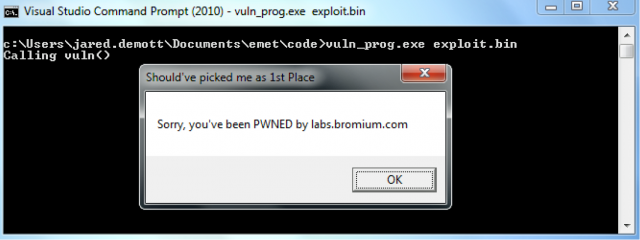
Researchers have developed attack code that completely bypasses Microsoft's zero-day prevention software, an impressive feat that suggests criminal hackers are able to do the same thing when exploiting vulnerabilities that allow them to surreptitiously install malware.
The exploit code, which was developed by researchers from security firm Bromium Labs, bypasses each of the many protections included in the freely available EMET, which is short for Enhanced Mitigation Experience Toolkit, according to a whitepaper published Monday. Microsoft has long held out EMET as an important tool for extending the security of Windows computers. The proof-of-concept exploit shows the limitations of those protections. The Bromium exploit included an example of a real-world attack that was able to circumvent techniques designed to mitigate the damage malicious code can do when targeting security bugs included in third-party applications.
"The impact of this study shows that technologies that operate on the same plane of execution as potentially malicious code offer little lasting protection," Bromium Labs researchers wrote in a blog post. "This is true of EMET and other similar userland protections. That’s because a defense that is running in the same space as potentially malicious code can typically be bypassed, since there's no 'higher' ground advantage as there would be from a kernel or hypervisor protection. We hope this study helps the broader community understand the facts when making a decision about which protections to use."
Read 5 remaining paragraphs | Comments